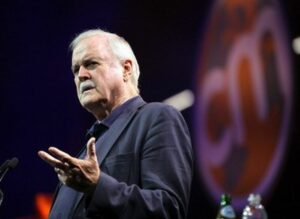
John Cleese discussing the content creation process at Content Marketing World
What is Content Marketing?
“Content marketing” is a blanket term that describes the process of creating and sharing relevant brand information in hopes of engaging current consumers and attracting new ones.
According to Content Marketing Institute, the formal process can be defined as “a strategic marketing approach focused on creating and distributing valuable, relevant, and consistent content to attract and retain a clearly-defined audience — and, ultimately, to drive profitable customer action.”
There are two keys to this definition. The first is that content marketing is indeed a strategy. The second is that content marketing is marketing. That means we are looking for some kind of behavior change. We are not creating content just to keep busy developing blogs or videos or more content for social…we are doing this so our audience will act in a certain way over a certain period of time.
What is Successful Content Marketing?
While content entrepreneurs and smaller content creators work to create an audience, and then monetize that audience in direct and indirect ways, content marketers generally use content marketing to do three things.
- Sales: The goal of the content marketing initiative would be to generate product or service sales in some way.
- Savings: The initiative would help save the money some kind of cost in relation to another marketing activity.
- Sunshine: Delivering the content over a long period of time creates better customers. These are generally customers who buy more or stay more loyal.
A newer model for many enterprises includes a fourth reason – the profit center. This is detailed in my book with Robert Rose called Killing Marketing. The idea here is that when an enterprise develops an audience over time, they can drive revenues just like a media company, including advertising, subscription, events, and affiliate revenues…ultimately becoming profitable in and of itself.
What Does Content Marketing Look Like?
Content marketing looks like any kind of media, so generally, we recognize it in its particular channel.
For example, it could be a blog, such as Indium’s blog From One Engineer to Another, which is a lead generation effort for the company targeting engineers. It could also be a newsletter, such as The Hustle, owned by Hubspot. It could be an event, such as Dreamforce from Salesforce.com. Or, it could be an online training site, such as Alpha Universe, run by Sony.
Once a company finds content marketing success, the small content efforts end up looking like full-fledged media enterprises. Some examples are Red Bull Media House on the consumer side, or Arrow Electronics on the business-to-business side, which created Aspencore, a conglomerate of B2B electronics media properties. Arrow now reaches more than three million engineers on a daily basis and is the largest media company in the industry.
What is the Future of Content Marketing?
Content marketing, as a practice, isn’t for every enterprise. Most content programs take years to build an audience and see positive marketing results. So many companies fail at content marketing because they lack patience. In addition, for content marketing to work, the message must be differentiated (content tilt) over time. Most organizations have a difficult time telling a different story.
That said, while not all enterprises employ content marketing, all innovative companies will.
In addition, I believe that what we see as content marketing today will be the higher education of tomorrow. Enterprises, flush with cash, have the opportunity to become the leading educational institutions of tomorrow. In the next 10 years, college students will forego the education at Stanford and take classes at Amazon, Google or insert company of your choice.
For more on the enterprise business model for content marketing, check out Killing Marketing. To understand the small-business case for content marketing, take a look at Content Inc.
About the author
Joe Pulizzi is founder of multiple startups including content creator education site, The Tilt and is the bestselling author of seven books including Content Inc. and Epic Content Marketing, which was named a “Must-Read Business Book” by Fortune Magazine. Joe is best known for his work in content marketing, first using the term in 2001, then launching Content Marketing Institute and the Content Marketing World event. He has two weekly podcasts, the motivational Content Inc. podcast and the content news and analysis show This Old Marketing with Robert Rose. His foundation, The Orange Effect, delivers speech therapy and technology services to over 200 children in 34 states.







